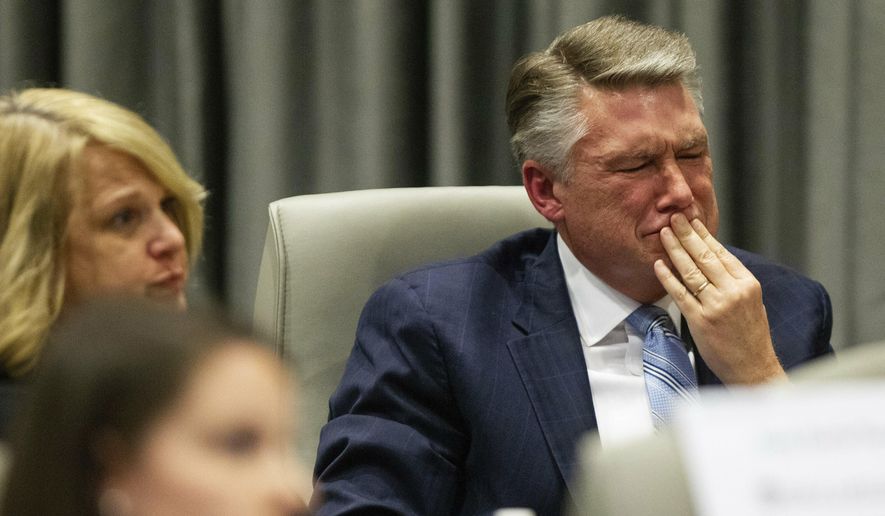Republican leaders on Capitol Hill acknowledged this week that a GOP congressional candidate in North Carolina illegally harvested absentee ballots, requiring an electoral re-run, but they wondered where was the outrage when the same tactic produced hundreds of thousands of votes for Democrats in California.
Senate Majority Leader Mitch McConnell on Tuesday demanded closer scrutiny of the mass collection of absentee ballots not just in North Carolina, where it is illegal, but in the states — like deep blue California — that allow it.
“This practice makes elections a kind of scavenger hunt to see which side’s operatives can return to headquarters with the most ballots in the trunk of their car,” Mr. McConnell, Kentucky Republican, said on the Senate floor.
“And once those operatives take a hold of those ballots, the voters have no way to keep tabs on whether they were ever delivered. Of course a system that invites political operatives to be rewarded for turning up ballots will open the door to misbehavior,” he added.
Mr. McConnell said he had “noted with interest that Democrats’ new focus on this practice has yet to extend to California — where it is a completely legal, common practice. California allows anyone — not just family members, anyone — to show up at a polling place or election office with ballots that are not theirs. Reports suggest that Orange County alone saw 250,000 absentee ballots dropped off in person on Election Day last year.”
Republicans have been grumbling since the midterms about suspected ballot-harvesting in California, where it is legal and massive canvassing operation are typically spearheaded by labor unions.
A flood of absentee ballots in the midterms helped Democrats pick up nearly every contested congressional seat in California and cement the party’s takeover of the House. In Arizona, another state that allows harvesting, an influx of absentee ballots helped erase Republican Martha McSally’s lead and sent Democrat Kyrsten Sinema to the U.S. Senate last November.
California Democrats are unmoved by the criticisms and accusations of hypocrisy.
“It’s legal in my state. I haven’t heard any complaints. Have you heard any complaints?” Rep. Jackie Speier, California Democrat, told The Washington Times.
She brushed aside the issues raised by Mr. McConnell.
“If they were to mark the ballots that would be illegal. … There are homebound people. It could be any number of things,” she said.
However, Rep. John Lewis of Georgia, the Democrat’s strongest advocate for voting rights, said he was open to outlawing the practice nationwide.
“We should look into it,” he said.
In North Carolina, a political operative paid by the campaign of Republican Mark Harris collected absentee ballots from voters in two counties. That illegal scheme alone was enough to taint Nov. 6 results that showed Mr. Harris beating Democrat Dan McCready by 905 votes.
Evidence suggested some absentee ballots were filled in by the political operative and others were not sealed when they reached the polls, which is the same irregularities feared in California where the practice is legal and widespread.
The North Carolina State Board of Elections last week ordered a new primary and general election to fill the 9th District seat, which has been empty since the new Congress convened Jan. 3.
Mr. Harris announced Tuesday that he would not run in the new election.
Rep. Eric Swalwell, California Democrat, said that the problem in North Carolina was that GOP operatives broke the law. That, he insisted, was not happening in his state.
“You have to follow the law where the law is,” he said. “The rules in North Carolina are that you cannot do that. They didn’t play by the rules. The state’s get to determine their elections rules. Individuals must follow them.”
In his Senate floor speech, Mr. McConnell noted that the ballot harvesting issue was missing from House Democrats’s anti-corruption bill, H.R. 1 or “For the People Act of 2019,” which seeks to bolster campaign finance, ethics and voting rights.
“Instead, it contains provision after provision that would erode the protections that are supposed to ensure votes reflect the voice of the voter whose name is on the envelope. Provision after provision would erode common-sense protections and bring the guardrails down. Would a serious reform bill aim to take away states’ abilities to impose meaningful ID or signature requirements for voters? Would someone concerned about ’restoring democracy’ dismiss signature verification as an obstacle to be removed?”
“I don’t think so,” he said.
• S.A. Miller can be reached at smiller@washingtontimes.com.




Please read our comment policy before commenting.